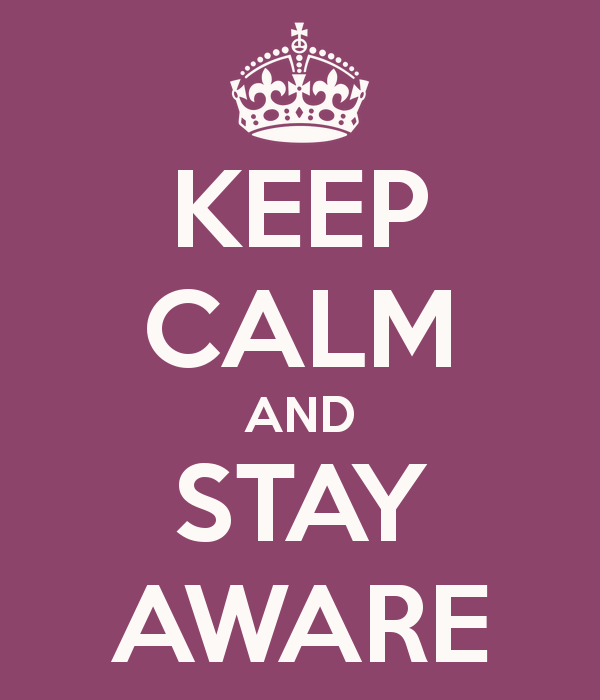
I worked for a spell as a locksmith while I was starting college and again briefly when I laid-off out of college. I learned very quickly more about situational awareness working that job than anywhere else I’ve been. When working on locks in bad areas (and even “good areas” for that matter), you develop a set of eyes in the back of your head. Whether there’s a domestic dispute that happens over changing locks, or the someone’s trying to set up to roll you, it paid to recognize when stuff “didn’t look right”.
While I chuckle about some of the stories now, the serious fact is that it only took one time for a pissed off estranged husband coming home when his wife is having you re-key the locks on him, to cement in the brain that one should keep an eye on what’s going on as far out as they could.
If I was doing a rekey and two domestic partners weren’t home together, I was always watching for cars to come driving up and who was getting out and walking up. I’d pay attention very closely to squirrely folks trying to get me to do a job under seemingly weird circumstances or not wanting to pay up front late at night. Simple things really, but when you’re in a mode to analyze the mechanical aspect of your job, it’s easy to not be thinking on two planes or not reading the non-verbals of the person requesting the work.
There was this one time I had a guy come rolling up on a job site, get out of his work van, start charging me with something that could have been used as a weapon, in his hand! I was finishing up writing a bill and immediately had to switch to survival mode. With my hand on my gun, side stepping my vehicle door, the guy stopped on a dime as I shouted for him to stop. The situation de-escalated once I started talking. I’ve never recognized being so close to having to use my firearm to defend myself. And thankfully I didn’t have to un-holster the weapon. But situations like that reinforced several things – being able to switch gears in a millisecond is paramount, de-escalation is better than paperwork and lawyers if possible, and keep your head up, if nothing else than using your periphery and ears.
Luckily I had a good on the job mentor that I worked with and I learned real quick how to position myself while working, if nothing else to give myself a couple extra degrees of periphery.
Another time, I got called out to a really cruddy part of town. At the time, I wasn’t even licensed to be carrying. It was just me, and a mobile tool shop worth $40,000.00 going into a bad job. What I chuckle about now is, how long it took me to realize this was a setup. What I had going for me in this particular situation was that the thugs that were trying to roll me were just a little more stupid than myself. I’ll give it to the criminals though, they were dedicated, they tried to coordinate and block me in the ‘hood’ during my escape. First car chase. Got the blood moving that’s for sure.
To be honest, had I not pretended like I didn’t realize what was going on, buying just enough time to put myself in a position to exit the site, I may have lost a work van and a whole lot of tools, or worst, I could be dead. I was in the type of neighborhood where people had been robbed and shot over $2. Two . . . Dollars. By God’s grace I kept my wits about me, played it calm and caused a little misdirection – again, if I hadn’t I doubt I would have made it to vehicle. Not a lot of folks can do that right off the bat. And how I did, is beyond me because at the time, I hadn’t received any training from professional guys.
And if I may, I’d like to digress for a second for folks that have never been in a life and death situation where someone doesn’t quite like their existence: You just truly don’t know what you’ll do until you’re THERE for the first time. That’s why self-defense training is so important. 1. It improves the odds of surviving for the people who’ve never been in the situation they’re training for and 2. It gives people who’ve survived and perhaps thrived in bad situations a chance analyze what went well, what didn’t go well, and improve upon both.
Fast forward to where I’m at now. I’m in a completely different line of work. (Actually up until recently though, I was still required to regularly visit locations that were less than desirable places to so much as drive through, while sticking out like a sore thumb in business attire. Argh.)
Knock on wood, I’m in a very safe location for 95% of my work now. But I remember some of the lessons I learned with “on the job” training as often as I can. In doing so, I am forced to think about these four things:
- Multi-Tasking – while the term is kind of misleading, I like trying to keep sharp by being able to complete certain tasks while remaining somewhat aware of who’s approaching and for what purpose based on how they approach. There’s always room for improvement in this area. I know my mentor was forced to play chess as a kid while having his favorite radio station or record on in the background. Try doing two things you really like doing at the same time. There are so many professional drills if you do a google search it’s not even funny.
- Keep Your “Wits” About You – This is a hard one. We’ve become an emotional society. Every man cries on TV at the drop of a dime. (while I have nothing against men shedding a tear, there’s a time and place). Learning more about stoicism might improve your outlook, I know it did for me. I see some people afraid to die, trying to live well beyond 75 or 80 years. Look, God gave us a set amount of time on earth, He already knows the time you and I have left. Let’s accept the fact that we’re going to DIE. While hastening one’s demise for the sake of un-virtuous behavior is stupidity, it’s not about how long we live that counts, it’s what we do. My loved ones know how I value them. My job is to provide for and protect my family. Losing one’s wits in an emotional fueled response or lack of response impedes that. The best way to exercise this virtue in my humble opinion (aside from purposely putting yourself in dangerous situations without a professional “spotter”), is to learn to stay calm in the little things that piss us off. I’m not saying not to get pissed, I’m just saying stay calm. Easier said than done for some. Second to that, is to seek out self-defense training that safely puts you in somewhat stressful situations.
- De-Escalation – De-Escalating a situation requires one to swallow their pride sometimes, it requires one to think from the point of view of “what does my adversary desire?” or “Can I make them believe I’m complying?”. This is theoretically/metaphorically the same as a feign in boxing. I can honestly say “buying time” can save your life or at the very least delay a passionate butt-whooping. Mostly though, buying time can give one the opportunity to de-escalate the situation, but not always. De-escalation comes second to leaving the situation though. Every time I’ve de-escalated a heated situation it was due to the fact that my exit effectively impeded and I didn’t want to go to guns or fisticuffs if I didn’t have to. Common sense prevails. De-escalation tactics can be practiced all the time, especially in the emotionally charged society we live in. Practice calming someone down in the business world without ever using the phrase “calm down”. If you haven’t read Dale Carnegie’s How to Win Friends and Influence People, you might pick up a few ideas.
- Telegraphed Behavior – Girls telegraph when they want to be kissed or are about to kiss a guy without saying a word. (Conversely, they have a way of telling a guy “I’m not in to you, if you were the last guy on earth”, which is really funny when the guy on the end of that message is not ‘bi-lingual’.) Guys telegraph when they’re going to try and knock someone out or shake their hand without saying a word. This is called non-verbal behavior. In my small experience, reading non-verbal behavior gives one a “crystal ball” effect for the next 5 to 10 seconds of the future.
The project management institute claims that up to 55% of communication is non-verbal. Yet people get so ticked off by text messages and blog articles and forums . . . when they’re only getting 45% of the intended communication. (There are the talented anomalies “out there” – some people are SO skilled at ticking others off, they only require 25% of their message to be received by the audience to cause what it takes normal folks 10 minutes of face to face, determined antagonizing to accomplish.) If you’re pretty good at predicting what people in a room who you’ve never met are about to do, you’re probably pretty good at reading non-verbals on a conscious level. We all read non-verbals, it’s just a matter of consciously recognizing small nuances in behavior to accurately predict proceeding actions. Our day to day lives are rife with training opportunities. The next time someone breaks down in tears, slams something down violently in anger, or any other applicable emotional response that might relate to a confrontation, think about what their non-verbals were saying right before it happened. Did their body stiffen up like a board, did their face contort, did they shift their weight in an awkward way?
The last thing anyone wants to do is have to pull a gun in self-defense. For some people due to their job, it’s a much higher risk, where as some folks it’s a very remote chance. Either way, when your number’s up, it’s up. Don’t fear the reaper, stack the deck in your favor by consciously practicing these things. While I’m not an expert in these areas, these skill sets have helped me out of some less than desirable situations. Maybe you’ve found that to be true as well.
When it comes down to it, by the time you’ve pulled your gun in self-defense and engaging a threat, you’ve begun to mitigate the damage. You’re already in a pickle. Either way you’ll have lasting repercussions – physical and legal. The art of self-defense in normal society is won and lost in awareness and self-control. By the time guns are drawn one is only mitigating the threat to choice between “do I have my day in court or am I a flat-liner?”.
Thanks for stopping by,
- Irish

Interesting, I worked as a locksmith, too! 😉 Good article, keep it up.
LikeLiked by 1 person